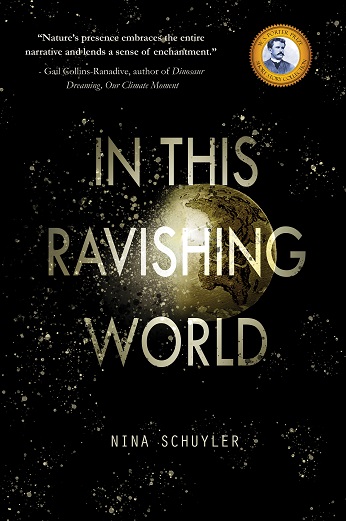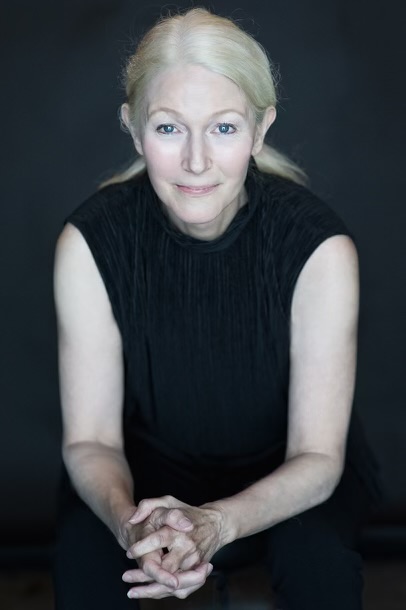I wondered if I animated Nature, what it would say. I wanted to find out, so I imagined my way into Nature and let it speak.
Nina Schuyler – 2 July 2024
The Back Flap
In this Ravishing World is a sweeping, impassioned short story collection, ringing out with joy, despair, and hope for the natural world. Nine connected stories unfold, bringing together an unforgettable cast of dreamers, escapists, activists, and artists, creating a kaleidoscopic view of the climate crisis. An older woman who has spent her entire life fighting for the planet sinks into despair. A young boy is determined to bring the natural world to his bleak urban reality. A scientist working to solve the plastic problem grapples with whether to have a child. A ballet dancer endeavors to inhabit the consciousness of a rat. In this Ravishing World is a full-throated chorus— with Nature joining in— marveling at the exquisite beauty of our world, and pleading, raging, and ultimately urging all of its inhabitants toward activism and resistance.
About the book
When did you start writing the book?
June 2020. I live in Northern California with my family, and we were stuck in the house, sheltering in place. To escape the house, the world and my family—it’s a small house—I began to write little scenes. The longer we sheltered, the more I wrote little scenes. My other escape was to walk around the block. Fortunately, trees accompanied me, along with birds and the howl of coyotes in the hills. A memorable day would be seeing a blue kingfisher. The sky was full of sun on many days, and I returned home revived.
How long did it take you to write it?
That’s a very hard question. As you probably remember, during the pandemic, time sloshed around. I rarely knew what day it was. We’d look outside and see it was light, so it was day, but what day, exactly? Even after we figured it out, we forgot it because one day was like the next day, and for weeks on end, we stayed in our house.
Where did you get the idea from?
I read Ursula K. Le Guin’s short story, Mazes, told from the perspective of a lab animal, perhaps a rat, trapped and dropped in a maze. It realizes the “giant” that trapped it is running a kind of test but has no interest in communicating with it. The creature is utterly baffled. Then I read her story, Direction of the Road, told from an oak tree’s point of view near a road. It reminded me of all the children’s books I’d read to my sons with animated rabbits and bears and turtles. Why did we leave them behind?
Then, after one of California’s wildfires, I heard Governor Gavin Newsom say on the radio, “Nature is talking.” I wondered if I animated Nature, what it would say. I wanted to find out, so I imagined my way into Nature and let it speak. One of the first things Nature said was: The human ear can hear a sound wave as low as 20 hertz, the lowest pedal on a pipe organ, or pick up a pitch as high as 20,000 hertz, a soprano singer’s C7. This might be the problem: I don’t speak in your range.
Nature is speaking, but it can’t understand why no one hears it. After this, eight human characters emerged, each representing a different response to Nature’s question: Why isn’t anyone listening to me?
Were there any parts of the book where you struggled?
I had to write and rewrite Nature’s voice, so it plumped up with many emotional registers: marveling at the earth’s beauty, reeling at the losses, raging at what hasn’t been done, urging, crying, singing. On and on. A siege of emotions.
What came easily?
The passion to write the book. That came as smoothly as soft butter. I wanted to do it, I wanted to do something. The earth has given me so much, I wanted to give something back.
Are your characters entirely fictitious or have you borrowed from real world people you know?
I think the creative mind is always a mix of the real and the fictional. I teach creative writing, and I tell my students that although writers are solitary beings, crouched in our minds inventing and imagining, we are also madly in love with the world, especially if you define love as paying attention.
We all know how important it is for writers to read. Are there any particular authors that have influenced how you write and, if so, how have they influenced you?
So many!
Virginia Woolf taught me that style is content and so much can be done with a sentence. I am constantly picking up her books and reading passages to hear the rhythms.
James Salter for his eloquent compression. So much power and imagery in his short sentences.
Toni Morrison, whose work is steeped in style. I read her books over and over.
Elena Ferrante for giving us strong, complex, multifaceted female characters, especially in her Neapolitan Quartet.
Do you have a target reader?
I think the first draft is for the writer–what gives me pleasure. In revision, the story begins to search for a bigger audience. My ideal reader is someone interested in being entertained and also entertaining ideas.
About Writing
Do you have a writing process? If so can you please describe it?
I’m a magpie, collecting bits and pieces from the world. I keep collecting, reading things—not just fiction but science, philosophy, psychology–listening, experiencing, until something intrigues me; it keeps coming back or it won’t leave me alone. Usually, it’s an idea. I love ideas. Then, I began to imagine my way into the characters.
Do you outline? If so, do you do so extensively or just chapter headings and a couple of sentences?
At this point in my writing life, for short stories, I don’t outline. I’m comfortable and excited to sit in the unknown and see what unfurls. For novels, I usually have a sense of what has shaken the protagonist’s world, a hint of the climax, and a possible ending. As I’ve grown older, I’m more comfortable not knowing and throwing myself into writing and seeing where it goes. We talk about writing to discover, but writing also changes you, usually for the better, plunging you into the depths of emotion and meaning.
Do you edit as you go or wait until you’ve finished?
I can’t move forward unless there are–at least a handful–of sentences that please my ear. Not just please, but spark excitement and a desire to go on with it. I wish it weren’t so, but it is. I inch forward, crossing things out, replacing words, rewriting sentences, changing a semicolon into an em-dash.
Did you hire a professional editor?
Do you listen to music while you write? If yes, what gets the fingers tapping?
I sit in a tiny room; the door closed, sometimes with noise-canceling headphones so I don’t hear the children call out, “Mom, where are my shoes?” “Where is my basketball?” I like silence. I have blocks of time before my young son bursts home from school with friends and they are famished, and everything must stop. I’m so happy I have children. They are a joy and a pleasure and hard work and they absolutely create a deadline: things must get done before they come home from school.
About Publishing
Did you submit your work to Agents?
I entered this short story collection into contests, and fortunately, it won two: the Prism Prize for Climate Literature and the W.S. Porter Prize. The prizes included money and the publication of the collection. Thank you to the judges!
What made you decide to go Indie, whether self-publishing or with an indie publisher? Was it a particular event or a gradual process?
I love Indie publishers! They are willing to take risks and publish some of the most exciting, innovative, creative work, satisfying choice-starved readers. In 2022, all the literary prizes at least internationally went to Indies—the Booker, The International Booker, the Nobel, The Goldsmiths, the Pulitzer, and Australia’s Victorian Prize for Literature.
Did you get your book cover professionally done or did you do it yourself?
The publisher created this lovely cover.
Do you have a marketing plan for the book or are you just winging it?
Fortunately, a marketing plan is in place. It’s busy and noisy out here in the marketplace. People are yelling from every street corner about their books. It’s cacophonous and loud, and I’ve been told I have a soft voice. I’m immensely grateful it isn’t only me on the street corner waving a homemade sign and trying to sweeten the deal with a plate of cookies.
Any advice that you would like to give to other newbies considering becoming Indie authors?
I’d research the Indie publishers and see which ones are publishing work similar to yours. What have they published? Have their books done well? If possible, reach out to one of their authors and ask about their experience. Was the book edited? How many ARCs will be sent to reviewers? Is there a publicity budget? What do they do to promote their books?
End of Interview:
For more from Nina Schuyler, visit her website and follow her on Facebook, Instagram and Twitter.
Get your copy of In This Ravishing World from Amazon US or Amazon UK.


